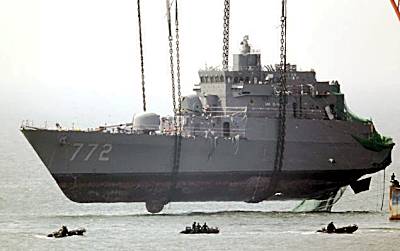WASHINGTON, Aug. 30, 2011 — The NATO mission in Libya is important, effective and still necessary to protect civilians in that embattled nation, a NATO spokeswoman said today.
“As long as threats remain, there’s still a job to be done and we will get that job done,” Oana Lungescu told reporters today at NATO headquarters in Brussels.
“The mission will continue in full compliance with the United Nations mandate for as long as it’s needed, but not a day longer,” she added.
Joining her in a live videoconference from Naples was Col. Roland Lavoie of the Canadian air force, NATO’s military spokesman for Operation Unified Protector.
“The Gadhafi regime is collapsing and rapidly losing control on multiple fronts,” Lavoie said. The port of Tripoli now is accessible to commercial and humanitarian shipping, said he added, and the two metropolitan airports are secured.
The new Libyan authorities are now providing for the security of Tripoli, Lavoie said, and the National Transitional Council is demonstrating its leadership and its ability to coordinate the provision of services to the city’s residents.
“These are very encouraging signs, indeed,” the colonel added.
“It looks as if we’re nearly there, but we’re not there yet,” Lungescu said, adding that in the past week the world has had vivid reminders of the continuing threats.
“We’ve seen the grim pictures from Tripoli and the allegations of mass graves, executed prisoners and a hospital full of dead patients,” she said. “We’ve seen more reports of how the regime has been using mosques, schools and marketplaces as shields for its weapons.”
NATO must make sure these threats are gone for good, Lungescu said. It’s imperative, she added, that “the civilians and cities in Libya are safe so that the Libyan people can build a new future based on democracy, reconciliation and the rule of law.”
Lavoie said the main area of attention now is the corridor between Bani Walid and the eastern edge of Surt, where pro-Gadhafi forces maintain a varying presence in several coastal cities and villages, and some inland areas.
“Gadhafi forces are being pushed out of the greater Tripoli area,” Lavoie said. “Despite the presence of remnants of the regime, the Tripoli region is essentially freed, with the retreat of pro-Gadhafi forces to the areas of Bani Walid to the southeast of the capital,” where they no longer represent a direct threat to the population of Tripoli.
Over the past week, anti-Gadhafi forces opened the northwest coastal route linking Tripoli to the Tunisian border, the colonel added.
“As the overall security situation improves, this vital link will gradually allow for more road movements,” Lavoie said, “which means more food, more water, fuel, medicine and other supplies.”
Once NATO’s job is done, Lungescu said, “it is for others to take over the lead in supporting Libya.”
The North Atlantic Council will decide when the Libya mission is complete based on the military advice of Operation Unified Protector commanders and the military authorities, she added.
“Last week when the North Atlantic Council met, there was consensus around the table, together with the contributing partners in Operation Unified Protector, that the anti-Gadhafi momentum is irreversible and there was full commitment to continue the mission until the mandate is fulfilled but no longer than is absolutely necessary,” Lungescu said.
U.N. Secretary General Ban Ki-Moon will travel to Paris Sept. 1 to take part in a senior-level meeting on Libya, she said.
“This will be an opportunity for further coordination of international support for the people of Libya,” Lungescu said, “as they finally begin to hold the future in their own hands.”
Source:
U.S. Department of Defense
Office of the Assistant Secretary of Defense (Public Affairs)

 von
von 